Fast Pass Nation
Those with the means can buy their way out of more and more of life's inconveniences.
After a brief hiatus following her departure from the NewsBeast, Megan McArdle has taken her blogging talents to Bloomberg. In the interim, she and the hubby went to several of the Old Dominion’s theme parks and discovered the joys of FastPass.
Both Busch Gardens and Kings Dominion offered customers the opportunity to jump the queue, for a price ranging from $20 per person (at Water Country USA, the Busch Gardens water park) to $55 for the roller coasters. This is real money, of course, but it wasn’t prohibitive; it was less than we were spending on hotels and food, or for that matter, the theme park tickets.
If you love roller coasters and hate standing in line, a fast pass improves the theme park experience in ways that are hard to communicate. Most of the days that we were there, the lines on the favorite rides stretched to several hours. With a fast pass, it took us longer to walk between the roller coasters than to get on the rides and hurtle around the track. We easily doubled or tripled the number of rides we were able to take.
Pretty much a no-brainer if you’re there to ride the rides. And, yet, despite a rather low limit on the number of passes made available—presumably, to both ensure that the cut in line was worth it to those paying extra but not a huge burden on those without the passes—they never sold out. Megan guesses that it’s not a matter of price but guilt.
People just don’t like fast passes. It doesn’t feel right.
It didn’t even feel completely right to me, and I’m pretty close to homo economicus. I could tell myself that we weren’t actually hurting anyone in a meaningful way, and this was true — because so few queue-jumping passes were issued, the most anyone ever waited because of us was another minute. Arguably, our passes even helped to slightly lower the price of their tickets. But it felt bad to see everyone else patiently standing in line while we stepped onto the roller coaster with no wait. And a lot of the theme park attendants clearly didn’t approve of us.
The only theme parks I’ve gone to in the FastPass era were run by Disney and they have an interesting solution to the problem: You can’t buy a FastPass. They’re free! Anyone who wants to get a FastPass for a given ride has the same opportunity as everyone else to do so on a first come, first served basis. But you can only have one FastPass at a time, which means if you’re trying to skip the queue on a particularly popular attraction, you may have to come back three or four hours later and have to stand in line for other rides with the masses in the interim. If anything, it becomes a game of strategy.
Megan draws a larger point from the experience:
The real problem with fast passes isn’t that they allow a tiny number of people to jump the queue; it’s that those people start feeling that they should never have to mingle with the people who don’t have the passes. They act like entitled jerks who have the right to shove everyone else out of the way. No wonder the theme park attendants were suspicious of us.
Perhaps the reason they’re so obnoxious — and hers wasn’t the only family I saw pushing through the line while we waited to get to our entrance — is that more people are living a fast pass Life. Getting a special queue with special service isn’t a rare treat, something to indulge in on your first vacation in three years. It’s a permanent condition. Jump the security queue at the airport because you’re a frequent flyer. Walk straight into your rental car because you’re a Hertz#1 Club Gold member. Don’t like the kids your children are hanging around with? Push them into an elite program, or buy a house in a more exclusive school district. Join a gated community so the wrong people can’t even walk near you.
There’s certainly something to all that. On the one hand, it probably makes sense to offer customers who pay for it better service. I don’t resent First Class passengers getting a bigger seat and “free” booze, even though I tend to fly economy. For that matter, I’m not sure there’s much of a problem with programs that give frequent fliers/renters a means around the annoyances of standing in line, which is compounded in their case by said frequency. But, yes, it can create a sense of entitlement.
In these parts, there’s an experiment going on with High Occupancy Toll lanes on some of the more crowded highways, allowing those willing to shell out more money a way around sitting in traffic. Said uncrowded lanes were constructed on the dime of the taxpayers—who had to endure even more traffic congestion during the years it took to construct them—and yet their use is restricted to those with the means and/or will to pay. There’s a good economic argument for this but it nonetheless strikes me as morally problematic.
On the other hand, I’m not sure how one gets around the “entitlement” problem. Rich people have always had ways to avoid the worst aspects of life but, as the divide between the rich and everyone else widens, they’re able to buy their way out of more of them.
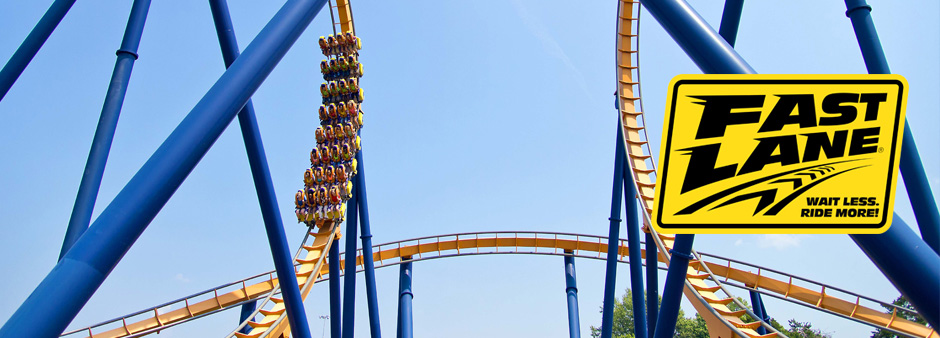

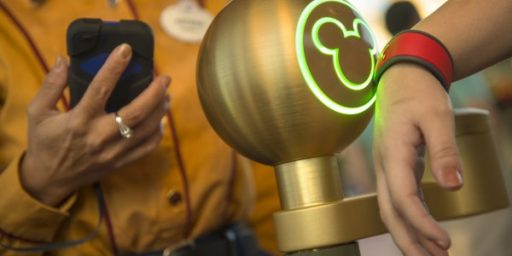
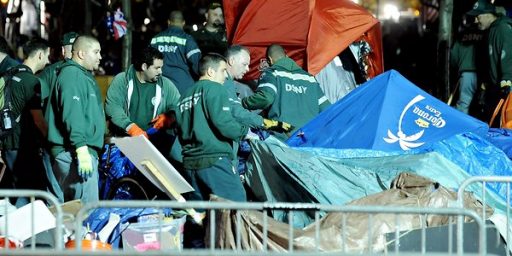

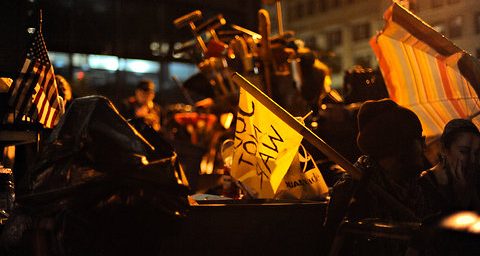
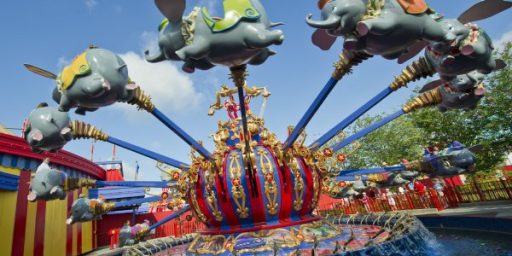
As Michael Sandel pointed out in his book, What Money Can’t Buy: The Moral Limits of Markets, this is, in fact, the golden age of the commodifying of everyday experiences.
I’m not so sure that amusement park fast passes really lead to being entitled jerks even inside the park, much less outside.
I first used FastPass type systems at Universal – a park already known for its ability to move people in and out as rapidly as possible. (Including some types of rides I’ve never seen anywhere else, such as the Harry Potter castle ride and the Hollywood Rocket rollercoaster, that literally never stop moving.)
I go to amusement parks specifically for the rollercoasters and occassionally some of the other rides (such as Cedar Point’s Power Tower, also on its FastPass, or Carowinds’ WindSeeker, again also on its FastPass), so for me, FastPass simply increases my value for going to the park – particularly when combined with a Season Pass. Indeed, for most parks, after the second trip to the park the Fast Pass is my primary expense that day and possibly my ONLY expense that day other than food and drink. (Carowinds is an easy day trip from where I currently live in Aiken SC and will be even closer when I move closer to my job later this year.)
As the article notes, it is really hard to articulate exactly what the FastPass does, so let me give an easy illustration: There are days where the line for say Intimidator at Carowinds can easily stretch over an hour, in some cases nearly 2 hours or more. If you don’t have a FastPass that is. Because their Fast Pass is unlimited as to the number of times you can be on a ride (though it is limited to certain rides – basically the roller coasters and WindSeeker), I can literally ride that ride a half dozen or more times in a row in that same time frame *easily*. And because I happen to be a single rider (my wife is nowhere NEAR the coaster enthusiast I am), the operators almost always call for the first available single rider in the normal line, thereby decreasing their wait times by a few minutes at least.
Seriously, for a coaster geek who is going to the parks *specifically* for the coasters, the Fast Pass is virtually the only way to go!
BTW: Different companies use Fast Pass differently. You noted Disney. Universal’s is *supposed* to be for one time for a limited number of rides, but I’ve found that until the operator team scans your pass, you can ride as many times as you want. Even once they scan your pass, if they never scan it again it is still unlimited in practical terms. All depends on who is guarding the line and how stickler they are for the rules. Six Flags’ Fast Pass system doesn’t allow early entry into the line, it simply reserves you a spot in line and tells you what time to show up, allowing you to do things other than stand in line. (Such as catch a show, shop, eat, etc) Cedar Fair’s Fast Pass (Carowinds, Cedar Point, several others – including Old Dominion IIRC) is what I described above – unlimited times riding a select few rides. Haven’t been to Busch Gardens, can’t tell you their policy. I believe Sea World’s (which only has two coasters + 1 water ride) is unlimited access to all their rides.
@Jeff Sexton: I have used fast pass at Disney World several times and they always always always checked them.
Best times to go to most theme parks is weekdays. I have never waited over a thirty minutes for Intimidator. Most times it is fifteen minutes or less. Nighthawk always has slow lines – takes too long to load the cars.
@Tyrell: Saturday afternoons midsummer are particularly bad for Intimidator, and I agree with Nighthawk. What gets me about that one is that I’ve been on half a dozen similar coasters and never really had that long a time to get on them. *POSSIBLY* due to the way NightHawk’s rail is on the ground in the station, rather than above your head?
One tHing that really bugs me is that airlines get to send their frequent travelers to special security lines. After all security is a federal police function and we are all Americans in that line, or our guests. Commercial operations should not be able to coerce this federal system into giving special treatment to their favored customers. And just so you know where I am coming from, I am a very frequent traveler and get a lot of privileges. The international lounges, the shorter lines at the airline counter, the automatic upgrades, those are at the discretion of the airline and I’m fine with that. But the TSA line is different.
I don’t fly enough to care about special security lines for frequent flyers.
As a person too cheap and too poor to justify buying a fast pass I am not a hue fan but theme parks have found a way to make money and people will pay it.
I have a kid on the spectrum and when he was younger he couldn’t tolerate standing in line so we would get what was essentially a free fast pass (we entered through the handicapped exits). At the time fast passes weren’t all that common in the theme parks we used. King’s Island (owned by Paramount at the time) allowed our whole party of 6 to cut the line-Six Flags would only allow 4 to cut the line. When he hit about age 10 he could better tolerate the lines so we stopped using the handicapped passes because we didn’t need them. I suppose we could still get them (parks don’t ask you to prove disability you just have to tell them there is one that doesn’t allow for long periods standing in line).
I have learned if you choose the right day paying the discounted after 4 or 5pm price can be economical. Crowds are smaller and lines shorter but still doesn’t compare to a fast pass.
The I-495 HOT lanes cost a whopping $1.80 most of the time (that’s if you go the whole length, if you’re only going a couple exits they’re less than $1.00) and they’re free if you have three or more people in the car. People traveling in the regular lanes also benefit because every car in the HOT lanes reduces the load in the regular lanes. And considering the scale of the project, congestion during construction really wasn’t that bad, especially considering how awful it could have been.
@Jeff Sexton: Yes-it is the rail location. Employees have to be extra careful while checking safety harnesses.
We also used the single rider entry available on some Disney rides. It worked well and our group still wound up close together.
If paying for a fast pass makes it possible for a family to cover a theme park in one day instead of two, it actually could save money.
Everyone assumed that the toll lanes on some Los Angeles freeways would attract mostly high-income commuters who could afford the expensive rush hour tolls. Hence their “Lexus Lanes” moniker. User surveys have shown, however, that the most frequent users are ordinary working stiffs who have to punch time clocks.
The talk over a national civic service is similar to that concerning TSA lines MarkedMan brought up. It’s like going to the DMV or the Social Security Administration. There should be a set of circumstances that everyone must uniquely bear to be American, whether it’s going through security at airports or trying to renew a driver’s license. It’s the ultimate expression of egalitarianism.
And boredom and frustration.
While a Cedar Point, I never noticed actually using the FastPass Lane. However, Cedar point for years had a concierge service that for more than $100 they would guarantee a ride on every roller coaster in the park. The real trick for the theme parks is to limit the numbers so that everyone else does not have a diminished experience. Cedar Point has also copied Disney where people staying in Cedar Point hotels get to enter early. That enable someone to ride one or two of the long line roller coasters and get in line or a third. Universal allows guest in their hotels to purchase the fast pass tickets at a discount.
I have also notice that several of the non-Disney parks have added theme meals for children and more playground type of amusement to appeal to families with children.
What is interesting is one some of the rollercoaster fan sites, there are analysis of how many guests can ride per hour, the wait per hundred people in line, and the expected wait per each day of the week. I have planned vacations using the data so that I could ride more rollercoasters at Cedar Point without having to pay more for it.
@superdestroyer: Got a link to some of those sites? Would be very interested in that data.
Additional to my previous comments: I do participate in two TSA programs that give what I consider legitimate special treatment. The first is for clearing US customs, and it allows me to skip the entire customs line when I get to the US, go to a kiosk instead, where it scans my passport and my fingerprints. In order to do this I signed up, had my background checked and then went to a 1 hour interview at a TSA (homeland security?) facility at a major airport. That also qualifies me for something called Pre-Clear and when flying domestically thru major airports I can get into a special lane where the security is basically what you would get pre-2001. Shoes remain on, leave your computer in your bag, etc.
I think the Disney model is pretty smart. Every minute you stand in line is a minute that you can’t spend money on food, drinks, and junk somewhere else in the park.
Question for people who think the fast passes are unethical:
Are you similarly bothered by restaurant reservations? After all, people with reservations get to waltz right in to the restaurant, “jumping ahead” of all the people waiting around for their seat number to be called. Should they, in the name of “fairness”, be required to wait in line like everyone else?
If they do not object to reservations, is it possible that their objection is just a reflexive dislike for change, which they’re just using concerns about egalitarianism to rationalize?
@Stormy Dragon: Appointment systems are different, in that everyone theoretically has the same chance to call up and reserve a spot. If reservations required paying, say, a $50 premium it would be more analogous.
@James Joyner:
There are a lot of restaurants (particularly non-chains one) where you ability to get reservations (particularly on busy nights) depends on whether or not the hostess recognizes you as a regular customer.
That is, in some sense, charging a premium for a reservation. They’re just not specifying a hard amount.
@James Joyner:
A reservation is still for a certain time slot, so even more analogous would be to pay the restaurant $50 and then just show up at the restaurant at whatever time you wanted that day and you would get the next table. I think those waiting for a table would have a lot more issues with that than with a reservations based system.
And I would be perfectly happy with a reservation based system that meant that you didn’t have to wait in line for a ride. And the reservations shouldn’t require you to pay.
——
I guess getting to skip the line at a club if you pay for a membership card would be a better none theme park example. (Getting to skip the line because you’re a celebrity or a young beautiful woman, that’s obviously something completely different.)
@Stormy Dragon: Same goes for reserved seats at events, and preferred parking.
@Tyrell:
Just wondering, but you’re not confusing it with buying tickets from a scalper, are you?
You pay extra and you don’t have to queue in a line or reload a website to get the best tickets.
That has a lot more in common with paying extra to skip the regular line than reserved seating….
If McArdle is right that people don’t buy the FastPass because they believe it is unfair to the masses, then why are these people going to theme parks at all? I mean, they charge (rather high) admission to get into the park at all, so a large number people can’t get to the rides with or without the FastPass. If so many people are suddenly so egalitarian, perhaps it won’t be long before they demand that the gates be flung open to all the people, liberating the rides for everyone? I really, truly believe the simpler explanation — that people don’t buy the FastPass because it’s more expensive.
James: “In these parts, there’s an experiment going on with High Occupancy Toll lanes on some of the more crowded highways, allowing those willing to shell out more money a way around sitting in traffic. Said uncrowded lanes were constructed on the dime of the taxpayers—who had to endure even more traffic congestion during the years it took to construct them—and yet their use is restricted to those with the means and/or will to pay. There’s a good economic argument for this but it nonetheless strikes me as morally problematic.”
I would be very surprised if the people using these were actually paying for the costs of the extra lane.
“On the other hand, I’m not sure how one gets around the “entitlement” problem. Rich people have always had ways to avoid the worst aspects of life but, as the divide between the rich and everyone else widens, they’re able to buy their way out of more of them.”
This is true; the problem is when the government works to help them buy their way out of stuff the rest of us have to tolerate.
This is an existentialist ethical issue for me. In my case I simply try to live my life in a way that would work ‘at scale’ – meaning I don’t just throw my coffee cup on the ground, I find a trash receptacle because if everyone littered we’d have a big mess. I drive as little as possible to minimize my impact on the earth. I probably fail in many ways to live up to this ethic – but I remain conscious of it and try to adhere as best my human soul can.
As others have noted above, HOT lanes and Fast Passes reflect the same ethical problem to me – there’s a quote above from superdestroyer that makes my point:
This goal is mathematically and logically impossible. One person jumping the line, by definition, moves everyone in the line back a spot and increases their wait time.
Well, the French had the guillotine. Not recommending it, just putting it out there for discussion.
@OzarkHillbilly: People who have stepped into the “fast pass lifestyle” (first class flights, TSA preferences, $100 bills to the doorman, etc) are enjoying this conspicuous consumption with some historically low tax rates – presumably these people, or their parents, are in a higher tax bracket. The solution is higher marginal tax rates.
If rich enough, they can still buy their way out of everything, true. But they will at least be contributing more to the commonweal. And if they were on the bubble with their consumption, the greater taxes will slightly decrease the number of people using these services.
If the concern is the widening gap between the rich and poor, the solution is generally raising marginal rates. A few extra tax brackets about $500,000 is a good start. And not historically unusual in America.